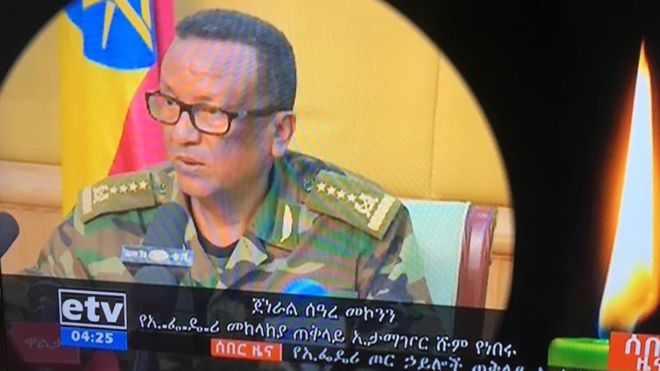
Gen Seare Mekonnen’s death was confirmed by TV channels
The chief of staff of the Ethiopian army, Gen Seare Mekonnen, has been shot dead by his own bodyguard in the capital, Addis Ababa.
He and another officer died trying to prevent a coup attempt against the administration in Ethiopia’s northern Amhara region, PM Abiy Ahmed said.
In Amhara itself, regional governor Ambachew Mekonnen was killed along with an adviser.
Ethnic violence has hit Amhara and other regions in recent years.
The prime minister went on TV dressed in military fatigues to denounce the attacks.
Since his election last year, Mr Abiy has moved to end political repression by releasing political prisoners, removing bans on political parties and prosecuting officials accused of human rights abuses.
The US state department has warned its staff in Addis Ababa to stay inside, saying it is aware of reports of gunfire in the city on Saturday.
What do we know about the attacks?
Gen Seare was killed along with another general, Gezai Abera, by the bodyguard who is now in custody, the prime minister’s press office said.
In Amhara the governor was killed along with senior adviser Ezez Wasie, while the region’s attorney general was wounded.
Lake Ayalew has been appointed the region’s acting governor.
The prime minister’s office accused Amhara’s regional security chief, Asaminew Tsige, of plotting the coup attempt. It was unclear whether he had been arrested.
“The coup attempt in Amhara regional state is against the constitution and is intended to scupper the hard-won peace of the region,” the office added.
“This illegal attempt should be condemned by all Ethiopians and the federal government has full capacity to overpower this armed group.”
Why is Amhara so important?
The homeland of the Amhara ethnic group is the country’s second most populous region and has given Ethiopia its state language, Amharic.
Violence between the Amhara and Gumuz ethnic groups left dozens of people dead last month in Amhara and its neighbouring region, Benishangul Gumuz.
Ethnic violence, typically sparked by land disputes, has displaced nearly three million people across Ethiopia.
Another issue the prime minister is having to grapple with is unrest within the military.
In October, he said that hundreds of soldiers who had marched to his office to demand a pay rise had wanted to kill him.
Mr Abiy survived a grenade attack at a rally in June last year which killed two people and left more than 100 injured.
Source: BBC























